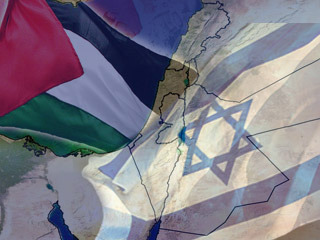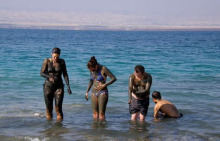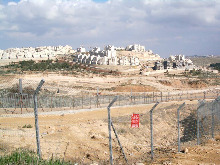Matt Rees's Blog - Posts Tagged "east-jerusalem"
The war Israelis and Palestinians plan
 I posted this on Global Post. JERUSALEM — There’s an old Arab aphorism: “A man with a plan takes action; a man with two plans gets confused.” Apply that to the Israelis and to the Palestinians, and the nonsensical sequence of recent events in the Middle East starts to fall into a comprehensible pattern.
I posted this on Global Post. JERUSALEM — There’s an old Arab aphorism: “A man with a plan takes action; a man with two plans gets confused.” Apply that to the Israelis and to the Palestinians, and the nonsensical sequence of recent events in the Middle East starts to fall into a comprehensible pattern.It’s not a pleasant pattern, because it leads to war.
First, before we get to the fireworks, let’s recap all the nonsense.
The Palestinians refused to talk to the Israelis from December 2008, when a relatively centrist Israeli government made a peace offer the Palestinians rejected. Since then, small economic reforms and big U.S. security aid have made life in the West Bank fairly free of violence. Better, for sure, than life in Gaza, which is still a mess more than a year after the Hamas-Israel war there.
Israelis elected a center-right-dominated parliament a year ago, and Benjamin Netanyahu formed a rightist cabinet. He refused to halt building in Israel’s West Bank settlements, as President Barack Obama demanded. Even when forced by Washington to put a transparently fake freeze on construction he declined to include East Jerusalem.
The Palestinians wouldn’t restart direct peace talks until there was a freeze on the Israeli neighborhoods of East Jerusalem. So the Americans eventually persuaded them to have indirect talks. Without much enthusiasm, the Palestinians agreed.
Why no enthusiasm? Leading Palestinians, including chief negotiator Saeb Erekat, had already started to talk about a new failed round of talks leading quite simply to a “one-state solution.” That means, no division of the land, just a single state in what’s now Israel, the West Bank and Gaza. One adult, one vote. Soon enough, of course, that means no Jewish majority and the end of Israel as a Jewish state.
Meanwhile, Israel largely escaped the financial crisis of the last two years and its citizens spend little time fretting about the Palestinians. In Tel Aviv, the discovery of old bones by workers building an underground emergency room for a hospital led last month to an attempt by ultra-religious politicians to block the construction, and protests by locals who cried out against religious coercion.
No such mass protests against continued building in the settlements. That proceeds, even to the extent that during the last month announcements of new construction in East Jerusalem have caused a major crisis in relations with Washington. In one case, the planned building of a mere 20 apartments in an Arab neighborhood of East Jerusalem forced Obama to take time out of his undoubtedly busy day to discuss it with Netanyahu.
There’s more nonsense, but let this much suffice for now.
Back to the Arab aphorism. Who has a plan, and who’s confused?
It’s clear that most Israelis and most Palestinians are living in denial — a kind of confusion, because it takes the illusion of current calm for a sustainable and welcome period of peace.
Israelis know the settlements can’t go alongside a two-state solution, but they don’t choose one or the other.
Palestinians know that the way to stop the settlements eating up the hilltops around their towns is to strike a deal now and rule their own state, but they won’t do it so long as life is relatively good and the international pressure is all on Israel. Leaders of Fatah and Hamas have called for a “third intifada” several times in the last four months — not for renewed talks, only for renewed violence. But a mere handful of kids came out to throw rocks and Molotov cocktails.
With no sense of urgency on either side, Western diplomats shake their heads and try to nudge the two nations to the negotiating table. It’s time to realize that neither side wants talks.
While most Israelis live in denial, a sizeable minority pushes for more building in the West Bank and East Jerusalem. They’re not building so that they can later give up that land and see all the money they’ve pumped into their real estate wasted. The purpose is to make the West Bank inseparable from Israel. To kill the two-state solution.
In that scenario, either the Palestinians agree to be second-class inhabitants of the area -- fat chance -- or they leave. Well, with a little nudge.
On the Palestinian side, negotiations seem unlikely to lead to the satisfaction of every single demand. So the one-state solution starts to look good to them, too. However, second-class citizenship isn’t an option, and neither is leaving.
That’s the collision course Western diplomats refuse to countenance. When envoys talk about getting the “peace process on track,” it sounds good. But that process has been trucking along since the early 1990s. Peace has been getting further away. The “process” allows for a sense of activity, while all the time events — settlement construction, terror attacks — make it harder to draw lines on a map and make the populations secure.
It’s time to figure out a new diplomatic strategy to deal with the Israelis and Palestinians. One that’s based on the assumption that, in the longterm, they’re expecting war.
Published on April 06, 2010 02:02
•
Tags:
arab, barack-obama, benjamin-netanyahu, conflict, crime-fiction, east-jerusalem, fatah, gaza, global-post, hamas, intifada, islam, israel, israelis, jerusalem, jews, journalism, middle-east, palestine, palestinians, settlements, tel-aviv, war
What's floating in the Dead Sea?
 If you’ve ever slathered your skin in the healing, mineral-rich mud of the Dead Sea, you may want to stop reading now.
If you’ve ever slathered your skin in the healing, mineral-rich mud of the Dead Sea, you may want to stop reading now.More than 8 million gallons of sewage from East Jerusalem is pumped downhill to the Dead Sea, raw and untreated, every day. That’s not just a little icky for those of us who like to float in the lowest body of water on earth. It’s also an environmental catastrophe, and potentially another flashpoint in the conflict between Israelis and Palestinians.
“It’s the greatest environmental hazard in the country,” said Naomi Tzur, Jerusalem’s deputy mayor, who heads the planning and environmental committees on the city council. “I don’t sleep easily at night knowing that this is happening.”
The Dead Sea is one of the contenders to be named among the Seven Natural Wonders of the World in an online poll that organizers estimate will draw a billion voters by the time results are announced next year. But its location also puts it in the firing line of a conflict almost as bitter as the sea’s highly saline water.
Read the rest of this post at my blog The Man of Twists and Turns.
Published on June 27, 2010 08:08
•
Tags:
bustan, dead-sea, east-jerusalem, environment, germany, israel, kidron-valley, middle-east, palestinians, sewage
Israeli settlements: frozen, still cooking
 JERUSALEM — Palestinian negotiators said again this week they’d refuse to re-enter direct peace talks with Israel unless the current partial freeze on construction in Israeli settlements is extended when its term runs out in September.
JERUSALEM — Palestinian negotiators said again this week they’d refuse to re-enter direct peace talks with Israel unless the current partial freeze on construction in Israeli settlements is extended when its term runs out in September.But as a report released this week by the Israeli human-rights organization B’Tselem reveals, a real settlement freeze would have to be a very, very big chill.
B’Tselem’s report, called “By Hook or By Crook: Israeli Settlement Policy in the West Bank,” documents the massive scope of Israel’s settlement operation. It says that hundreds of millions of dollars are being paid to settlers, real estate developers and settlement municipalities as incentives to expand the settlements. It also highlights the manner in which every layer of Israeli bureaucracy continues to be involved in an expansion project that successive Israeli governments have pledged in international forums to halt.
For the human rights group, the issue is not political. Jessica Montell, B’Tselem’s executive director, said that the inequality of life in the West Bank — rather good if you’re an Israeli and pretty bad if you’re Palestinian — is the most objectionable upshot of the settlements, which she adds are illegal under international law.
“In the West Bank, your rights are based on your nationality,” she said.
Read the rest of this post on my blog The Man of Twists and Turns.
Published on July 23, 2010 22:03
•
Tags:
b-tselem, benjamin-netanyahu, east-jerusalem, george-w-bush, human-rights, israel, israeli, jessica-montell, middle-east, palestine, palestinian, road-map, settlement-freeze, settlements, tel-aviv, west-bank



